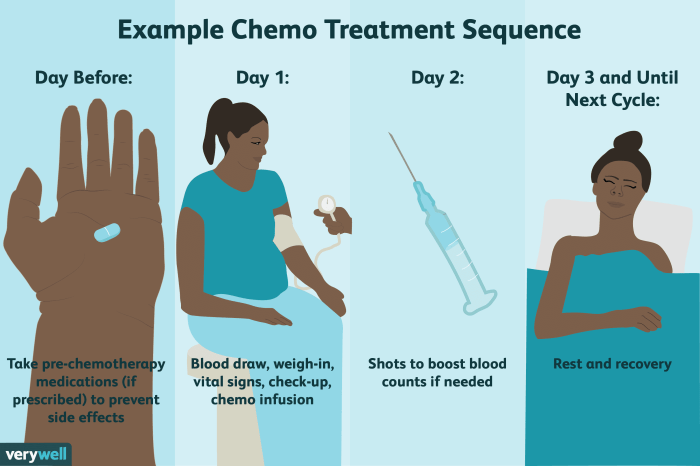Client is receiving chemotherapy for treatment of breast cancer – As clients embark on chemotherapy treatment for breast cancer, they embark on a journey that demands both physical and emotional fortitude. This comprehensive guide serves as an invaluable resource, providing evidence-based information, practical strategies, and compassionate support to navigate the complexities of chemotherapy and its impact on well-being.
The intricacies of chemotherapy, its mechanisms of action, and the diverse array of drugs employed in breast cancer treatment are meticulously examined. Common side effects are thoroughly explored, empowering individuals to anticipate and effectively manage these challenges. Furthermore, the indispensable role of nurses in administering chemotherapy, educating patients, and providing unwavering support is illuminated.
Chemotherapy for Breast Cancer: Client Is Receiving Chemotherapy For Treatment Of Breast Cancer

Chemotherapy is a systemic treatment that uses powerful drugs to kill cancer cells throughout the body. In breast cancer, chemotherapy is often used as an adjuvant therapy after surgery, radiation therapy, or hormone therapy to reduce the risk of cancer recurrence.
It can also be used to treat advanced breast cancer that has spread to other parts of the body.
Mechanism of Action, Client is receiving chemotherapy for treatment of breast cancer
Chemotherapy drugs work by targeting rapidly dividing cells, including cancer cells. These drugs damage the DNA of cancer cells, preventing them from multiplying and spreading. Different chemotherapy drugs have different mechanisms of action, but they all aim to kill cancer cells or stop their growth.
Types of Chemotherapy Drugs
- Anthracyclines (e.g., doxorubicin, epirubicin)
- Taxanes (e.g., paclitaxel, docetaxel)
- Vinca alkaloids (e.g., vinblastine, vinorelbine)
- Alkylating agents (e.g., cyclophosphamide, cisplatin)
- Antimetabolites (e.g., methotrexate, 5-fluorouracil)
Common Side Effects
- Nausea and vomiting
- Fatigue
- Hair loss
- Low blood counts (anemia, neutropenia, thrombocytopenia)
- Mouth sores
Nursing Considerations for Chemotherapy
Nurses play a crucial role in the care of patients receiving chemotherapy. Essential nursing assessments include monitoring for side effects, providing symptom management, and educating patients about their treatment.
Essential Assessments and Monitoring
- Vital signs and general physical examination
- Complete blood count and chemistry panel
- Assessment of nausea, vomiting, and other side effects
Principles of Chemotherapy Administration
- Dosage calculation based on body surface area or weight
- Drug preparation according to specific protocols
- Administration through intravenous infusion or oral medication
Patient Education and Support
- Providing information about chemotherapy and its side effects
- Teaching self-management strategies for symptom control
- Offering emotional support and counseling
FAQ Summary
What are the most common side effects of chemotherapy for breast cancer?
Nausea, vomiting, fatigue, hair loss, and neutropenia are among the most prevalent side effects.
How can I manage the side effects of chemotherapy?
Anti-nausea medications, dietary modifications, rest, and supportive care measures can effectively alleviate side effects.
What is the role of nurses in chemotherapy administration?
Nurses play a pivotal role in calculating dosages, preparing drugs, administering chemotherapy, and monitoring patients for adverse reactions.
How can I prepare for chemotherapy treatment?
Prior to treatment, it is essential to discuss potential side effects, lifestyle adjustments, and support systems with your healthcare team.
What are the long-term effects of chemotherapy?
Long-term effects may include fatigue, cognitive changes, and an increased risk of certain health conditions, requiring ongoing monitoring and support.


